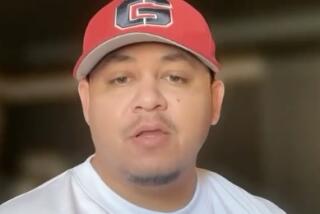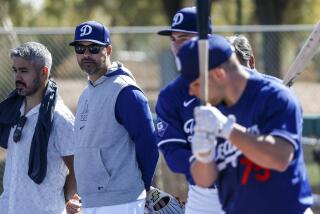This Week, Fargas Will Come All the Way Back
- Share via
“Never surrender.”
Those words, tattooed on Justin Fargas’ right shoulder, help explain how Fargas was able to come back from a leg injury doctors compared to being in a major car accident.
It took almost two years, three surgeries and lots of sweat and tears, but there was Fargas last weekend standing near the end zone in his Michigan uniform preparing to receive the opening kickoff against Bowling Green.
There were 110,585 people packed into Michigan Stadium, and Fargas wasn’t about to let the moment slip away without contemplating his journey back from the abyss.
“I soaked it all in,” he said. “I saw the fans, I heard the cheering and it was so good to be part of it again. To be away from the game so long . . . I loved football and for it to be taken away, that was hard.”
He had never suffered a major injury during his four years at Notre Dame High, but near the end of his freshman season at Michigan, his athletic career was put in jeopardy.
On Nov. 14, 1998, Fargas’ right leg was shattered in a game against Wisconsin. For an athlete who had always relied on his speed, the injury was devastating.
“To take away my ability to run is like Superman losing his cape,” Fargas said.
During the first surgery, he had two titanium rods and 12 screws implanted in his leg. Four months later, Fargas learned the leg wasn’t healing properly. The bones had to be reset. He had a second surgery, with two metal plates inserted.
Back on crutches, back to starting his rehabilitation from scratch.
Then came a third surgery to repair tendons in his right big toe.
Knowing that, it’s easy to understand the excitement he felt returning to the field last weekend.
“There’s so much anticipation, almost two years waiting for one game,” he said.
On his first carry, he ran for three yards, then lost the ball on a fumble.
“If I could have written the script myself, I wouldn’t have written that,” he said. “It was unfortunate. It reminded me of my first carry my sophomore year of high school. I fumbled it and thought football was over. But I learned it was not my last carry. It settled me down.”
Fargas finished with 70 yards in eight carries against Bowling Green as a backup to senior Anthony Thomas. He felt no pain in his leg, just the normal bumps and bruises a tailback experiences in a game.
Fargas is coming home Saturday when Michigan plays UCLA at the Rose Bowl. It’s a game he has looked forward to since he chose the Wolverines over UCLA and USC in 1998.
“It’s where I’m from and it’s going to be special and real competitive,” he said.
There will be more than family and friends rooting for Fargas next weekend. Most of Notre Dame’s varsity players are expected attend.
“We’ve got a lot of UCLA fans, but they can root for Justin and hope UCLA wins,” Coach Kevin Rooney said.
The game will feature the two best prep running backs in California in 1997: Fargas and the Bruins’ DeShaun Foster, who scored 59 touchdowns his senior year for Tustin High.
Foster, like Fargas, was injured last season. Fargas watched on TV as a healthy Foster rushed for 187 yards in 42 carries in UCLA’s victory over Alabama last Saturday.
“He had a remarkable performance, probably one of the greatest by a UCLA running back,” Fargas said. “I like to see that. I know how hard it is to have success at the college football level. I was impressed.
“It goes to show when someone has talent and gets an opportunity, great things happen. He had 42 chances to show his talent. This is his junior year. He’s been waiting to be the go-to guy. I’m in a similar situation but still in a waiting process.”
Coming home means Fargas can fill up on his stepmother’s beloved peach cobbler. For seven consecutive years, Sandi Fargas has been making the pie for Notre Dame players during hell week. Last month, she used seven gallons of peaches, 10 pounds of brown sugar, three pounds of raisins, a pound of butter and six cans of whipped cream to feed 80 Notre Dame players and coaches. They were licking every crumb off their plates.
The big question Fargas must answer at the Rose Bowl is whether he has regained the speed that once made him the fastest high school athlete in California.
“I feel fast,” he said. “You’ll get to see it first hand.”
Those who know Fargas understand what it means for him to play football again.
Sandi recalls Justin’s reaction the first time he played the sport at Notre Dame.
“I’ll never forget when he came in the door after his first freshman practice, [he said] ‘This is the greatest,’ ” she said.
Facing the greatest crisis of his athletic career, Fargas endured and recovered. Doctors, trainers, teammates, coaches, friends and his parents all helped in the healing process.
But in the end, it was Fargas who did the hard work and learned to run again, fulfilling his promise to never surrender.
*
Eric Sondheimer’s local column appears Wednesday and Sunday. He can be reached at (818) 772-3422 or eric.sondheimer@latimes.com.
More to Read
Go beyond the scoreboard
Get the latest on L.A.'s teams in the daily Sports Report newsletter.
You may occasionally receive promotional content from the Los Angeles Times.









